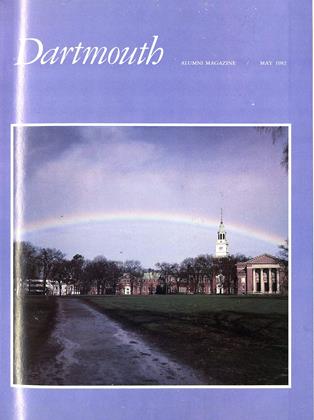In May of 1980, our friend ― he had countless friends here ― Jim Epperson died while pumping his bicycle up a long hill in Norwich. His heart gave out. It was the sense of his friends that this teacher who roamed so widely from his office in Sanborn House made Dartmouth a better place, a conviction affirmed by the following letter, dated Easter 1982, received by Karen Epperson, his widow. DEAR MRS. EPPERSON:
Though it is almost two years since your husband's death, his memory continues to inform and inspire. As an expression of gratitude for his life, we, a group of his students at Dartmouth, ask you to accept the enclosed checks and to use them for whatever purposes — personal or public you deem worthwhile.
We remember Professor Epperson as a poet in the fullest etymological sense of the word: a "maker" whose work of art was nothing less than the whole of his self. So fused were life and craft in him that his approach to literature could be seen as a mirror for his approach to life. He came to the great poets, then, a man wishing to learn about himself and the world; their work raised for him the moral issues, the ironies, the tragedies, and victories of the human condition. His legacy to us was precisely that combination of inquiry and appreciation that made up his life's quest: the probing into the essences and first causes of things, as well as the capacity to stand, completely without artifice, in awe of the mystery and beauty all around us. We also recognize beneath Professor Epperson's understated, though sometimes grufF wit and his, at other times, affable equanimity a quality of spirit — a faithfulness, if you will — characteristic of a man who loved the world and its inhabitants fiercely; for here was one who lived out the tension between the finitude of human resourcefulness and the possibility of meaningful action.
Professor Epperson was able to affect the quality of an ordinary day, arid that, says Thoreau, is the highest of the arts. His life and all that it embraced became a model for us — a constant reminder, as we live out our days, of all that being here on this earth can involve. Edmund Spenser, a poet Professor Epperson taught us to cherish, might just as well have been referring to your husband when he wrote: Loe I have made a Calender for every yeare,That Steele in strength, and time in duranceshall outweare;And if I marked well the starres revolution,It shall continewe till the worlds dissolution.To teach the ruder shepheard how to feede hissheepe,And from the falsers fraud his folded flocketo keepe.
 View Full Issue
View Full Issue
More From This Issue
-
 Feature
FeatureWhat keeps them going? A 'Mystic Glue' Perhaps
May 1982 By Dana Cook Grossman -
 Feature
FeatureTerrorism and the Niceties of Justice
May 1982 By Joseph W. Bishop Jr. -
 Feature
FeatureImpacts simply positive
May 1982 -
 Article
ArticleIn the Wide, Wide World
May 1982 By Peter Smith -
 Class Notes
Class Notes1964
May 1982 By Alexander D. Varkas Jr. -
 Class Notes
Class Notes1954
May 1982 By John L. Gillespie
Article
-
 Article
ArticleFACULTY ACTIVITIES
February, 1912 -
 Article
ArticleTHAYER SOCIETY OF ENGINEERS
June, 1926 -
 Article
ArticleMay Alumni Dinners
May 1954 -
 Article
ArticleDARTMOUTH SKIWAY: Fresh Powder Snow on a 50-Inch Base; Skiing Good to Excellent
March 1958 -
 Article
Article1930 Sponsors Art Show
MAY 1966 -
 Article
ArticleFrom the 47th Floor
OCT. 1977 By ANNE BAGAMERY '78

